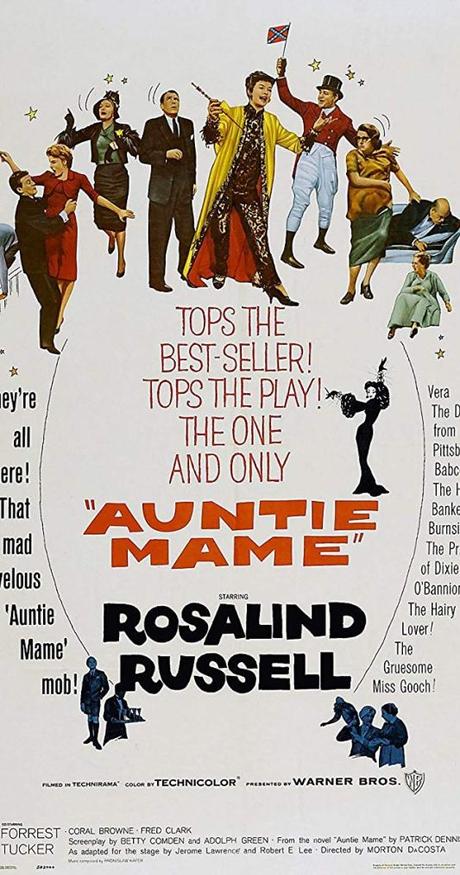
Reading from my shelves continues with this little gem from the 1950s. Auntie Mame was a runaway hit in the USA when it was first published, and made its author’s name (Patrick Dennis is a pseudonym; his name was actually Edward Everett Tanner). It was transformed into a stage play and a movie, and I can imagine it translates very well; I’d love to have seen it on stage. The book is light-hearted, genuinely funny and very well written, with a wide array of fantastically eccentric characters and a wry narrator in the now-grown ‘Patrick Dennis’, who recounts his many adventures with his outrageous Auntie Mame since she became his guardian on the death of his absent, conservative and phenomenally wealthy father when he was just ten years old.
At the beginning of the novel, Auntie Mame is a devastatingly beautiful, glamorous aesthete in her thirties, living in a gorgeous apartment in the heyday of 1920s New York. She is surrounded by a bevy of artistic and eccentric types, such as her actress friend Vera, who insists on speaking in a manufactured British accent, and is looked after by her Japanese man servant, Ito. She has been an actress and a chorus girl, but is far from stupid; she is well versed in French literature and fascinated by Freud. Patrick falls in love with his blithe, free-spirited young aunt immediately, and gleefully conspires with her to outwit the trustee of his trust fund, who wants to send him to the boarding school his father had wanted. Instead, he goes to a progressive school Auntie Mame discovers in New York, where he runs around naked with his classmates until his trustee finds out, and sends him off to be educated properly. While at school, Auntie Mame draws Patrick into her various madcap schemes, from becoming a champion horse-riding Southern Belle to impress the family of her billionaire husband, to chaperoning her pregnant secretary, who has been jilted by the ghostwriter working on her sure-to-be-bestselling autobiography. Forever reinventing herself, Auntie Mame becomes more and more uncontrollable and more and more embarrassing to Patrick as he gets older, always turning up and causing difficulties just when she’s not needed, but as he reluctantly discovers as he enters into adulthood, his clever, audacious and ever resourceful Auntie Mame often knows better than him – especially when it comes to matters of the heart.
I loved the character of Auntie Mame, and Patrick, too – their unlikely relationship is brilliantly drawn, and the cast of weird and wonderful hangers-on that surround Auntie Mame at various points of her life are a joy to discover. The settings are wonderfully evoked too; Patrick’s hellish, draconian boarding school sounds far worse than anything Eveyln Waugh depicts in Decline and Fall, and I loved the faded Southern grandeur of Mame’s husband Beau’s family estate. Each chapter moves forward in time and introduces a new escapade, and so even if one adventure or one location doesn’t interest you, there’ll soon be another along to draw you back in again. This is exactly the sort of light and frothy book that is quite typical of this immediately post-war period, and I very much enjoyed being entertained without having to think too much. It is a little over-long, and one or two of the escapades could have been cut without a loss to the rest of the book, but as it stands, it’s a fabulous read for when you need a pick-me-up, and as such, it’s perfect for these cold, rainy days of late Winter/early Spring, when you’re waiting desperately for the first rays of warm sunshine to pierce their way through the clouds.
